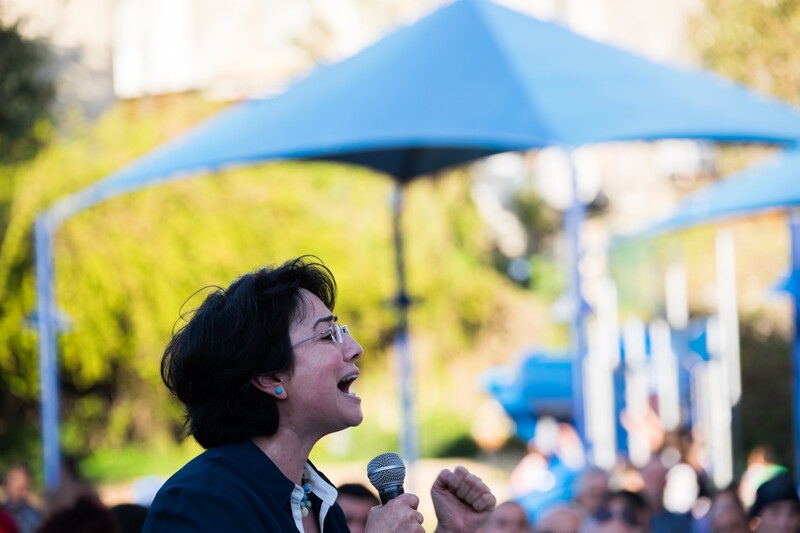Rights and Accountability 10 February 2016

Haneen Zoabi, a Palestinian member of the Knesset, Israel’s parliament, at a Joint Arab List election rally in Jaffa, on 14 March 2015.
ActiveStillsIsrael’s parliamentary ethics committee suspended three Palestinian lawmakers belonging to the Joint Arab List on Monday for visiting the families of slain Palestinians alleged to have participated in attacks against Israelis.
The three said they visited the 10 families in Jerusalem last week as part of a campaign to pressure Israel to return the bodies of Palestinians killed while allegedly attacking Israelis.
The Israeli authorities are keeping bodies in custody pending cash guarantees from families for the fulfilment of certain conditions, including limitations on the size of funerals.
Israel has withheld the bodies of dozens of Palestinians for long periods, eventually returning them in poor condition, families say.
Members of the Knesset Haneen Zoabi and Basel Ghattas were suspended for four months and Jamal Zahalka for two months.
According to Haaretz, Zoabi and Ghattas received longer penalties because of previous complaints against them in the ethics committee.
Zoabi has been banned from the Knesset twice before, most recently for six months in 2014 for expressing her understanding, and also disagreement, with those Palestinians who kidnapped and killed three Israeli teenagers while hitchhiking in the occupied West Bank.
The suspension does not prevent the lawmakers from voting.
False accusations
Israeli Prime Minister Benjamin Netanyahu responded that lawmakers who visited “terrorists’ families” should not serve in the Knesset.
“We invest great [efforts] into integrating Arab citizens in Israeli society, and they do the opposite.” Netanyahu said. “They build walls of hatred.”
While Netanyahu has led the push to suspend the members, the supposedly center-left Zionist Union has enthusiastically supported punishing the Palestinian lawmakers.
“The Knesset members are, with their own hands, cutting the last threads that still connect them to Israeli society. Instead of taking advantage of their status to bridge the gaps, with their own hands, they are digging the deepening hole of hate,” Ayelet Nahmias-Verbin, of the Zionist Union, said.
Eyal Ben Reuven, member of the Zionist Union and the ethics committee, said that Zoabi, Ghattas and Zahalkha were guilty of “inspiring terrorism and encouraging the murder of more and more Israelis.”
The Joint List has defended their members’ visit: “Netanyahu is well aware that the meeting’s purpose was to promote the release of the bodies, but he continues to distort facts and incite with false accusations.”
Holding bodies to ransom
Israel began holding the bodies of slain Palestinians in October, when violence escalated in Jerusalem.
In December, Israel returned most of the bodies, but is still holding around ten.
Public security minister Gilad Erdan says the bodies have not been returned because the families have not met conditions stipulated by the police to guarantee the funerals do not become venues for protests.
Erdan said the conditions are “designed to ensure that the funeral[s] are not turned into a show of incitement and support for terrorism.”
But on Tuesday Israel refused to return the bodies of Musab Ghazali and Ahmad Abu Shaaban, even after each family paid approximately $5,000 to guarantee they would only allow 50 people to attend their funerals.
Lawyers Muhammad Mahmoud of the Jerusalem Center for Legal Aid and Human Rights and Suhad Bishara from the Adalah Legal Center for Arab Minority Rights have said that Erdan was simply punishing the families by withholding the bodies.
New law
Monday’s decision to suspend the three lawmakers came after the Knesset approved a new and more sweeping version of a bill intended to streamline the suspension of lawmakers.
The new bill, which was formally approved on Monday, was reportedly formulated with “unprecedented” speed by immigration minister Zeev Elkin.
It would replace the criterion for suspension from “behavior unbecoming to a Knesset member” to one of three charges: denying Israel’s existence as a Jewish and democratic state, inciting racism and supporting “terrorism” or an “enemy state.”
Zoabi said the bill, which received the backing of the left-wing Zionist party Meretz, “revealed the face of the left” in Israel.
In a poll surveying Jewish Israeli citizens, 57 percent of respondents said the three lawmakers should be expelled from the Knesset, 35 percent said they should be prosecuted while just eight percent said they had not exceeded their authority.
The Joint Arab List is the third largest bloc in the Knesset. One fifth of Israel’s citizens identify as Arab or Palestinian.
Transparency bill
A controversial bill effectively targeting left-wing organizations that advocate for Palestinian rights also passed the first of three readings in the Israeli parliament on Tuesday.
The proposed law would require organizations that receive the majority of their funding from foreign governments to declare it on all documents they submit to the government.
The original requirement that members of such organizations wear badges indicating their organization had foreign funding when they visited the Knesset has been dropped.
It passed 50 votes to 43.
The legislation has been harshly criticized by European diplomats and human rights groups as targeting left-wing groups which are largely funded by European countries.
Right-wing organizations, many aligned with the government, also receive large amounts of money from abroad, but usually from private donors.






Comments
Suspended Palestinian law makers
Permalink Nabil Al-Murabit replied on
Bibi's komment about terrorists not serving in the knesset is hilarious, konsidering that many of the founders of Likud had backgrounds stemming from their time in the jewish terrorist group The Stern Gang